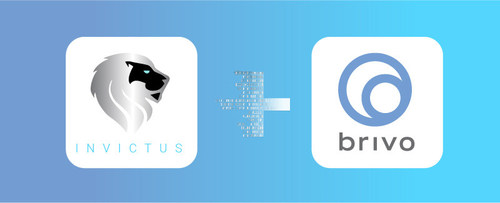LOS ANGELES, Jan. 6, 2022 /PRNewswire/ — Invictus, the up and coming entryway technology company, today announced its partnership with Brivo, the global leader in cloud-based access control and smart building technologies to connect Brivo’s access control solution with Invictus’ latest entryway technology, which includes an all-in-one software service, keyless entry, and self-guided tours for potential residents.
The integration between Brivo and Invictus makes it simpler for community members to enter their apartments, access common spaces, and book amenities without keys or fobs—all they need is their mobile device. The integration also minimizes property manager workloads by  streamlining visitor check-ins, facilitating self-guided tours for prospective renters, and offering an intuitive communication portal to more easily manage communication with residents. Instead of using multiple tools for building operations and resident relations, property managers can tackle it all through a single platform with the Brivo and Invictus integration.
streamlining visitor check-ins, facilitating self-guided tours for prospective renters, and offering an intuitive communication portal to more easily manage communication with residents. Instead of using multiple tools for building operations and resident relations, property managers can tackle it all through a single platform with the Brivo and Invictus integration.
“Smart building technology is becoming a necessity rather than an amenity, so we’re ecstatic about working with a leading proptech company like Brivo to give students and residents a modern rental experience,” said Kevin DeMattio, Founder and CEO of Invictus. “Physical hardware like keys or fobs are a burden for today’s renter and adds cost and administrative work for property managers. The Brivo and Invictus integration offers better access, communication, and experiences to attract residents and build a vibrant community.”
With Brivo, property managers have a robust cloud-based access control solution to keep residents and assets safe and secure. The Brivo API allows the Invictus resident app to embed Brivo mobile credentials, allowing residents to move throughout the community with ease. The API also enables property managers to create and manage both Invictus and Brivo resident data and permissions within the Invictus interface, removing the need to manually update two systems.
“We’re excited to partner with Invictus to empower multifamily property managers to offer residents a convenient, unified, keyless experience,” said Steve van Till, Founder and CEO of Brivo. “The modern apartment dweller is prioritizing buildings with smart amenities because it makes their lives easier. By integrating Invictus and Brivo, residents get more out of their living space, which helps improve resident retention for property managers.”
With Brivo credentials in the Invictus resident portal, dealing with apartment lockouts and complicated visitor check-ins will become bygone challenges. More information on the partnership can be found here.
About Invictus
Founded in 2015, Invictus strives to elevate and empower the community experience. With Invictus, both residents and property management have a product that puts everything in one place. Instead of navigating multiple login portals, residents can directly chat with their leasing office through our app, and have their needs taken care of without leaving the couch. Video intercom and digital keys have become the norm for entryway systems, but Invictus is more than that. Invictus fuses lifestyle and technology together to create an all-in-one smart community residents won’t want to leave.
About Brivo
Brivo, Inc., created the cloud-based access control and smart spaces technology category over 20 years ago and remains the global leader serving commercial real estate, multifamily residential and large distributed enterprises. The company’s comprehensive product ecosystem and open API provide businesses with powerful digital tools to increase security automation, elevate employee and tenant experience, and improve the safety of all people and assets in the built environment. Brivo’s building access platform is now the digital foundation for the largest collection of customer facilities in the world, occupying over 300 million square feet across 42 countries. On November 10, 2021, Brivo entered into a definitive merger agreement with Crown PropTech Acquisitions (NYSE: CPTK), which is anticipated to close in Q2 2022, subject to shareholder approvals and other closing conditions. The merger will result in Brivo becoming a publicly listed company on the New York Stock Exchange under the new ticker symbol “BRVS.” To learn more, read Brivo’s press release: https://www.brivo.com/brivo-to-become-publicly-traded-company-through-merger-with-crown-proptech-acquisitions/
Legal disclaimer: https://www.brivo.com/about/investor-relations/legal-disclaimer/
Article by prnewswire.com. Full article here.
 Having the latest in entryway technology means more than just letting residents into your building. An efficient and effective access control system encompasses multiple features to elevate and empower a multifamily or student living property. Residents not only need access to the main entrance of their building, but also to other access points, such as garages and their amenities areas.
Having the latest in entryway technology means more than just letting residents into your building. An efficient and effective access control system encompasses multiple features to elevate and empower a multifamily or student living property. Residents not only need access to the main entrance of their building, but also to other access points, such as garages and their amenities areas. As the world continues to change in a COVID-19 world, more and more renters are choosing how they move and choose their next place to live in. With changes in moving come new trends in what renters are looking for. According to a recent study conducted by the National Multifamily Housing Council (NMHC) and Grace Hill 2022 Renter Preferences Survey report, twenty-five percent of renters moved in the past eighteen months, and seventy percent predict to be teleworking the same amount or more moving forward.
As the world continues to change in a COVID-19 world, more and more renters are choosing how they move and choose their next place to live in. With changes in moving come new trends in what renters are looking for. According to a recent study conducted by the National Multifamily Housing Council (NMHC) and Grace Hill 2022 Renter Preferences Survey report, twenty-five percent of renters moved in the past eighteen months, and seventy percent predict to be teleworking the same amount or more moving forward. With 2022 ready to come in just a few days, property managers and the real estate are now looking at how to attract new renters for the upcoming year. One important demographic property managers are looking to attract is Gen Z. As the first group in history to be raised by the digital world, Gen Z renters are used to growing up surrounded by social media, research, and the newest innovations in technology at their fingertips.
With 2022 ready to come in just a few days, property managers and the real estate are now looking at how to attract new renters for the upcoming year. One important demographic property managers are looking to attract is Gen Z. As the first group in history to be raised by the digital world, Gen Z renters are used to growing up surrounded by social media, research, and the newest innovations in technology at their fingertips. With the COVID-19 pandemic entering its third year, trends are changing within the real estate and leasing industries. The environments in which people live, work, and learn have changed drastically with the implementation of working or earning a degree online at home. Students and the workforce alike realize the change to remote work, whether permanently or with a hybrid setting, results in having to make big decisions on their living space. The current workforce also considers factors such as location, cost of rent, and how much storage area they’ll need as they prepare to make their next big move.
With the COVID-19 pandemic entering its third year, trends are changing within the real estate and leasing industries. The environments in which people live, work, and learn have changed drastically with the implementation of working or earning a degree online at home. Students and the workforce alike realize the change to remote work, whether permanently or with a hybrid setting, results in having to make big decisions on their living space. The current workforce also considers factors such as location, cost of rent, and how much storage area they’ll need as they prepare to make their next big move. From starting as a sparsely used add-on feature to becoming an absolute necessity for rental housing,
From starting as a sparsely used add-on feature to becoming an absolute necessity for rental housing,  The appeal for 3D or virtual tours had been growing for renters since 2018. 3D and virtual tours give potential renters the option to view a possible living space without having to travel or take time out of their busy days for an in-person tour. In 2020, the preference for 3D and virtual touring due to the beginning of the COVID-19 pandemic. According to a
The appeal for 3D or virtual tours had been growing for renters since 2018. 3D and virtual tours give potential renters the option to view a possible living space without having to travel or take time out of their busy days for an in-person tour. In 2020, the preference for 3D and virtual touring due to the beginning of the COVID-19 pandemic. According to a  According to a new study published by Zillow, the percentage of renters who expressed a preference for online payment skyrocketed from spring 2018 to summer 2021. By the fall of 2020, sixty-nine percent of renters surveyed stated they preferred electronic payments. Electronic payments are not the only digital renting aspect becoming more popular, as the use of tools for signing rental leases has also seen substantial gains in 2021. Thirty-five percent of renters currently sign leases online, which is a 5-point increase from 2020.
According to a new study published by Zillow, the percentage of renters who expressed a preference for online payment skyrocketed from spring 2018 to summer 2021. By the fall of 2020, sixty-nine percent of renters surveyed stated they preferred electronic payments. Electronic payments are not the only digital renting aspect becoming more popular, as the use of tools for signing rental leases has also seen substantial gains in 2021. Thirty-five percent of renters currently sign leases online, which is a 5-point increase from 2020. With COVID-19 playing a major role in how people and technology work together in different industries, the future of brokers and real estate has changed as well. Some thought leaders have expressed concern about if AI and other tech innovations could take over human employees and continuing to drastically change the job market.
With COVID-19 playing a major role in how people and technology work together in different industries, the future of brokers and real estate has changed as well. Some thought leaders have expressed concern about if AI and other tech innovations could take over human employees and continuing to drastically change the job market.